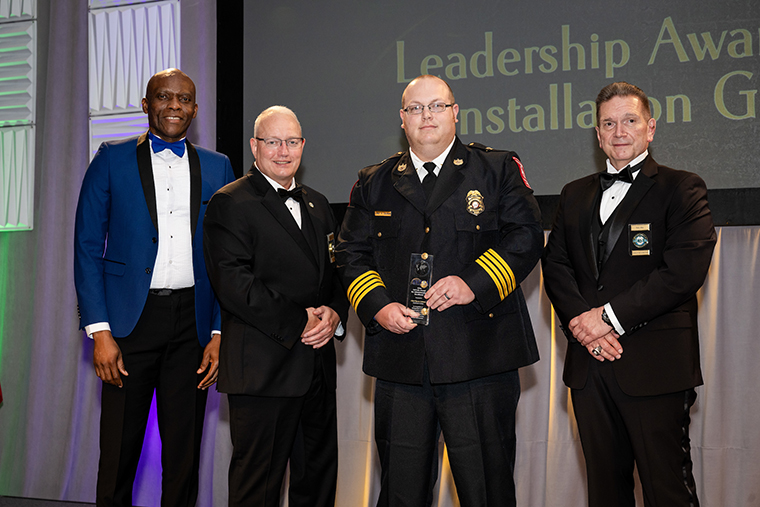Public Safety Chief Earns Recognition
Chief Ryan Colman was awarded the 2024 International Association of Campus Law Enforcement Administrators’ Award for Administrative Excellence.

Chief Ryan Colman receives the 2024 International Association of Campus Law Enforcement Administrators' Award for Administrative Excellence at their annual meeting. | © Mike Ritter 2024
Next month, Chief Ryan Colman of the Washington College Department of Public Safety will mark one year at the helm of the team of 10 officers, but he has already been recognized by his professional organization for changes he has made in the department and the effect it has had on campus.
“Ryan made an immediate impact within public safety and Washington College as a whole. He quickly changed the morale within his department and implemented new protocols,” said Thad Moore, associate vice president and director of athletics, who is Colman's direct supervisor. “He's also done an outstanding job engaging our student body and creating a welcoming environment for students to engage with him and his staff.”
The Award for Administrative Excellence from the International Association of Campus Law Enforcement Administrators (IACLEA) is given “for outstanding service in areas such as policy and planning, investigations, and/or crime prevention.”
In reflecting on the changes he has led at the department, Colman identified three that have been the highest priority and shown the greatest impact: updating policies, emphasizing training, and expanding community engagement.
Although policies can be easily overlooked, Colman pointed out that they are a central tool for the department to hold itself accountable, with formalized, written, public information about how the officers will approach everything from wearing their uniforms and maintaining their equipment to use of force, which is a continuum explicitly starting with verbal de-escalation of any situation.
He also updated the department's training policy, ensuring that all new hires—and he has made several to replace departing officers—are required to have 300 hours of field training before patrolling on their own and that all officers, newly hired or veterans, undertake ongoing training throughout the year. Those courses, whether online or in-person as a department, address everything from fire safety to community policing, from dealing with narcotics and their victims to how to engage people claiming imaginary “sovereign citizen” rights to ignore the law.
But the two areas of training Colman has emphasized the most are de-escalation techniques and crisis intervention, a skill in which Colman requires all of the officers to be certified.
“Unfortunately, mental health has always been an issue on higher education campuses, ” Colman said. “One of the biggest parts of our jobs is to be there when people are in need. We're here 24/7. We're here to help.”
Unlike many small colleges, Washington College Public Safety officers are commissioned as campus police officers by the state, empowered to make arrests and fulfill all other law enforcement duties on College properties. Colman stresses that this status is important because it improves the ability of the team to protect the safety and well-being of everyone on campus. Helping students, faculty, staff, and members of the public understand the department's focus on assistance alongside enforcement is a major goal of Colman's third focus: community engagement.
Last year he started offering regular doughnuts and coffee events to bring together officers and members of the campus community. They proved so popular the department found they had to make a second run to the bakery for more doughnuts before getting a sense of how many people would stop by. They have also offered snow cones and joined other fun campus events, ensuring officers and the people they serve interact in situations outside of emergency calls or patrols.
In the upcoming year, Colman and the department will be expanding another important element of community engagement: offering trainings for students, staff, and faculty in areas like self-defense and campus emergency procedures.
“In a short period of time, Ryan has proved himself to be a natural leader who has simultaneously earned the respect of his Public Safety team and the trust of our students,” said Vice President for Student Affairs Sarah Feyerherm. “We're incredibly proud of his recognition by IACLEA, which is just confirmation of the impressive accomplishments and character he has shown us since he arrived on campus.”
— Mark Jolly-Van Bodegraven